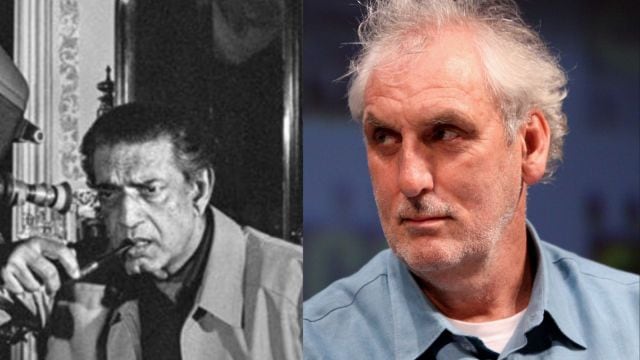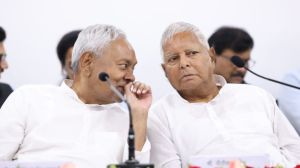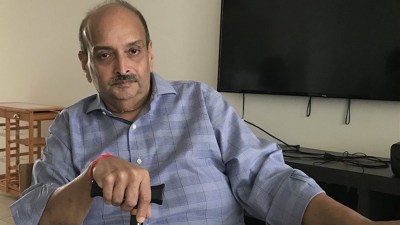‘Satyajit Ray taught us how to think small in scale but big in heart’: Australian filmmaker Phillip Noyce
Australian director Phillip Noyce, who will receive the Satyajit Ray Lifetime Achievement Award at IFFI, Goa, talks about the influence of Satyajit Ray, why the American film industry is facing mass unemployment, and the struggle of indie filmmakers.
 Noyce believes that the humanity in Ray's work inspired many filmmakers. (File/Wikipedia)
Noyce believes that the humanity in Ray's work inspired many filmmakers. (File/Wikipedia)Though Australian filmmaker Phillip Noyce was a 5-year-old when the legendary Satyajit Ray grabbed global attention with Pather Panchali, the movie has deeply impacted him and how he looks at cinema. Noyce, who will be awarded the Satyajit Ray Lifetime Achievement Award at the ongoing 55th International Film Festival of India (IFFI), Goa, believes that Ray’s “humanity” was a lesson for several Australian filmmakers.
“Ray was important to us as he continued the neo-realist tradition that Italian director Vittorio de Sica started. Ray taught us how to tap the genuineness of real people as well as to think small in scale but big in heart,” says Noyce, who has directed popular movies such as Clear and Present Danger (1994), The Bone Collector (1999), Rabbit-Proof Fence (2002), The Quiet American (2002), Salt (2010) and Lakewood (2021).
Elaborating on how Ray was a great inspiration for some Australian filmmakers when they were starting, the 74-year-old said, “Ray’s style encouraged us to make the film no matter what: Even if you don’t have money, you can work out a solution.”
Recounting his friend’s experience who visited Ray in Kolkata and was invited to visit his set, Noyce said that the friend travelled with the entire crew in a third-class compartment. “That’s a typical story we heard about Ray,” he recalls.
Noyce believes that Payal Kapadia’s All We Imagine As Light is a continuation of Ray’s approach to filmmaking. “Like Ray’s movies, the setting of her film is small but the idea is big”, he told The Indian Express. Though Noyce loves the Apu trilogy — comprising Pather Panchali, Aparajito (1956) and Apur Sansar (1959) — he picks the first as his favourite Ray movie. It is so moving, he said, especially the scenes when the father realises his daughter (Durga) is no more and when the family leaves their ancestral home.
Noyce believes that the humanity in Ray’s work inspired many filmmakers.
“We (Australians filmmakers) succeeded in Hollywood because we brought certain humanism to our films in America, which they had not seen before,” said Noyce. “Ray was inspiring not only as a filmmaker but also as a thinker,” said the filmmaker.
Known for delivering some of the biggest hits of Hollywood in the thriller genre, Noyce started his career in Australia, directing successful movies like Newsfront (1978) and Dead Calm (1988), which brought the 18-year-old Nicole Kidman to the limelight.
Later, he moved to Hollywood, directing a bunch of popular movies. “After 10 years in Hollywood, I realised that I am about to become the worst animal in the zoo — falling back on the Hollywood hack and riding on the back of its studio system. I went back to Australia to tell the stories that were in my heart,” he says.
That’s when he made Rabbit-Proof Fence – the movie he is “most proud of”.
The movie, about white Australians’ fraught relationship with Indigenous Australians, answers many questions that had bothered Noyce since his childhood days in Griffith, New South Wales. “We never studied pre-colonisation history. No explanation was given about the indigenous people. The film was also about changing white Australians’ attitudes towards them. It was the most successful film I made in terms of budget and the return,” he shared.
Many, however, discouraged him from making the movie as they were doubtful the audience would appreciate such a subject. To widen the film’s reach, Noyce adapted Hollywood’s publicity methods. “Good Hollywood films are sold successfully around the world. So are bad ones since they have the power to convince everyone that their lives would not be complete unless they watch this particular Hollywood movie. I used the same techniques of manipulation… The first person we employed for Rabbit-Proof Fence was a publicist and the last person to come off the project was the publicist,” says Noyce.
Summing up the current Hollywood scenario, Noyce says: “The American film industry is facing mass unemployment. There is a massive downturn in film production. One of the reasons is the streamers — they have worked out that they can make three Spanish films for the price of one American film. People are keen to watch movies related to other cultures.” He believes that the star system too seems to have taken a beating, as reflected in the poor box-office performance of Wolfs, an action comedy featuring Brad Pitt and Goerge Clooney.
According to Noyce, the independent film scene too is going through a rough phase. “It is all based on pre-sales. With the script and director, you pre-sell the movie based on the cast you have. You have a budget and you hope the pre-sale to be almost equal to that so that you can make the movie,” he says, adding that in America and Europe “the theatrical distribution, which is the first line of earning, is almost dead.”
Noyce, who thinks he missed out on so many films he wanted to make, intends to return to Australia and make more films.







